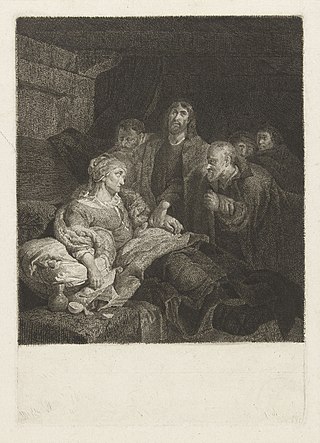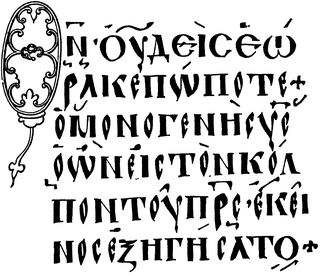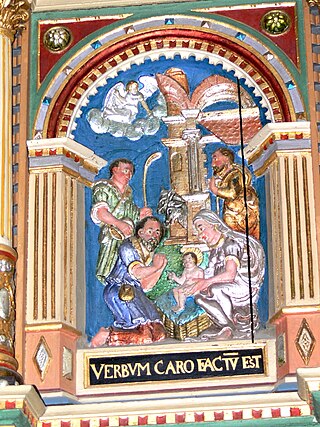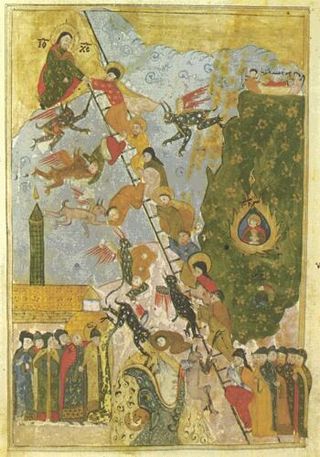| John 1:16 | |
|---|---|
← 1:15 1:17 → | |
 John 1:1–16 in Papyrus 75 (AD 175–225) | |
| Book | Gospel of John |
| Christian Bible part | New Testament |
John 1:16 is the sixteenth verse in the first chapter of the Gospel of John in the New Testament of the Christian Bible.
| John 1:16 | |
|---|---|
← 1:15 1:17 → | |
 John 1:1–16 in Papyrus 75 (AD 175–225) | |
| Book | Gospel of John |
| Christian Bible part | New Testament |
John 1:16 is the sixteenth verse in the first chapter of the Gospel of John in the New Testament of the Christian Bible.
In the original Greek according to Westcott-Hort, this verse is:
In the King James Version of the Bible the text reads:
The New International Version translates the passage as:
According to Witham, this implies an abundance of graces, and greater graces under the new law of Christ than during the time of the law of Moses; which is confirmed by the next verse. [1] Lapide elaborates on this greater grace saying, "Moses gave only an obscure and slight knowledge of God and the Holy Trinity, but by Christ a knowledge that was clear and full." [2]
Origen: "This is to be considered a continuation of the Baptist’s testimony to Christ, a point which has escaped the attention of many, who think that from this to, He hath declared Him, St. John the Apostle is speaking. But the idea that on a sudden, and, as it would seem, unseasonably, the discourse of the Baptist should be interrupted by a speech of the disciple’s, is inadmissible. And any one, able to follow the passage, will discern a very obvious connexion here. For having said, He is preferred before me, for He was before me, he proceeds, From this I know that He is before me, because I and the Prophets who preceded me have received of His fulness, and grace for grace, For they too by the Spirit penetrated beyond the figure to the contemplation of the truth. And hence receiving, as we have done, of his fulness, we judge that the law was given by Moses, but that grace and truth were made1, by Jesus Christ—made, not given: the Father gave the law by Moses, but made grace and truth by Jesus. But if it is Jesus who says below, I am the Truth, (John 14:6) how is truth made by Jesus? We must understand however that the very substantial Truth, from which First Truth and Its Image many truths are engraven on those who treat of the truth, was not made through Jesus Christ, or through any one; but only the truth which is in individuals, such as in Paul, e. g. or the other Apostles, was made through Jesus Christ." [3]
Chrysostom: "Or thus; John the Evangelist here adds his testimony to that of John the Baptist, saying, And of his fulness have we all received. These are not the words of the forerunner, but of the disciple; as if he meant to say, We also the twelve, and the whole body of the faithful, both present and to come, have received of His fulness." [3]
Augustine: "But what have ye received? Grace for grace. So that we are to understand that we have received a certain something from His fulness, and over and above this, grace for grace; that we have first received of His fulness, first grace; and again, we have received grace for grace. What grace did we first receive? Faith: which is called grace, because it is given freely3. This is the first grace then which the sinner receives, the remission of his sins. Again, we have grace for grace; i.e. instead of that grace in which we live by faith, we are to receive another, viz. life eternal: for life eternal is as it were the wages of faith. And thus as faith itself is a good grace, so life eternal is grace for grace. There was not grace in the Old Testament; for the law threatened, but assisted not, commanded, but healed not, showed our weakness, but relieved it not. It prepared the way however for a Physician who was about to come, with the gifts of grace and truth: whence the sentence which follows: For the law was given by Moses, but grace and truth were made by Jesus Christ. The death of thy Lord hath destroyed death, both temporal and eternal; that is the grace which was promised, but not contained, in the law." [3]

Unconditional election is a Calvinist doctrine relating to predestination that describes the actions and motives of God prior to his creation of the world, when he predestined some people to receive salvation, the elect, and the rest he left to continue in their sins and receive the just punishment, eternal damnation, for their transgressions of God's law as outlined in the Old and New Testaments of the Bible. God made these choices according to his own purposes apart from any conditions or qualities related to those persons.
The conditional preservation of the saints, or conditional perseverance of the saints, or commonly conditional security, is the Arminian Christian belief that believers are kept safe by God in their saving relationship with him upon the condition of a persevering faith in Christ. Arminians find the Scriptures describing both the initial act of faith in Christ, "whereby the relationship is effected", and the persevering faith in him "whereby the relationship is sustained." The relationship of "the believer to Christ is never a static relationship existing as the irrevocable consequence of a past decision, act, or experience." Rather, it is a living union "proceeding upon a living faith in a living Savior." This living union is captured in the simple command by Christ, "Remain in me, and I in you".
Matthew 11:13 is the thirteenth verse in the eleventh chapter of the Gospel of Matthew in the New Testament.
Matthew 11:29 is the 29th verse in the eleventh chapter of the Gospel of Matthew in the New Testament.

Matthew 10:5 is the fifth verse in the tenth chapter of the Gospel of Matthew in the New Testament.
Matthew 9:17 is a verse in the ninth chapter of the Gospel of Matthew in the New Testament.
Matthew 9:22 is a verse in the ninth chapter of the Gospel of Matthew in the New Testament.
Matthew 11:19 is the nineteenth verse in the eleventh chapter of the Gospel of Matthew in the New Testament.
Matthew 11:28 is the 28th verse in the eleventh chapter of the Gospel of Matthew in the New Testament.

Matthew 8:14 is the fourteenth verse of the eighth chapter of the Gospel of Matthew in the New Testament. This verse describes the start of Jesus healing Peter's mother-in-law.
Matthew 12:28 is the 28th verse in the twelfth chapter of the Gospel of Matthew in the New Testament.

John 1:18 is the eighteenth verse in the first chapter of the Gospel of John in the New Testament of the Christian Bible.

John 1:29 is the twenty-ninth verse in the first chapter of the Gospel of John in the New Testament of the Christian Bible.

John 1:14 is the fourteenth verse in the first chapter of the Gospel of John in the New Testament of the Christian Bible.

John 1:2 is the second verse in the first chapter of the Gospel of John in the New Testament of the Christian Bible.

John 1:17 is the seventeenth verse in the first chapter of the Gospel of John in the New Testament of the Christian Bible.

John 1:19 is the nineteenth verse in the first chapter of the Gospel of John in the New Testament of the Christian Bible.

John 1:39 is the 39th verse in the first chapter of the Gospel of John in the New Testament of the Christian Bible.

John 1:42 is the 42nd verse in the first chapter of the Gospel of John in the New Testament of the Christian Bible.

John 1:51 is the 51st verse in the first chapter of the Gospel of John in the New Testament.
| Preceded by John 1:15 | Gospel of John Chapter 1 | Succeeded by John 1:17 |